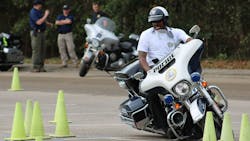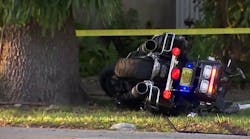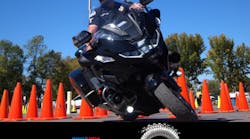The small flock of rubber ducks glued atop the officer’s helmet are the first thing you notice. Then maybe the words below them, “My 1st ride.”
Your curiosity piqued, you keep an eye out as you stand there at the barricade, waiting for the night’s Mardi Gras parade to roll, knowing the motorcycle patrolman is sure to make another pass before it does.
The rip and rumble of police motorcycles is a common sound at Mobile’s Mardi Gras parades, and so is the sight: Before the parade passes, the officers patrol up and down the route to make sure it’s clear, sometimes fast, sometimes slow enough to exchange high-fives with rows of young hands stretched over the barricades. Throughout the night they come and go, back and forth, sometimes circling in the spaces that open up between parade units, sometimes squeezing through the gap between a float and the barricades.
This time you see the ducks coming, and you see the prominent label across the front of the helmet: “ROOKIE,” it proclaims.
Ah, you think. But it turns out this isn’t a bit of hazing: It’s a voluntary tradition that provides a little bit of a window into the preparation it takes to spend hours twirling an 800-pound machine through tight quarters.
On Wednesday, well away from the parade route, Mobile’s motorcycle officers and a contingent of their Trooper counterparts from the Highway Patrol gathered in a parking lot far from the parade route for an all-day training session. Cones marked out a course full of slaloms and tight turns. As officers hustled their machines through, the familiar rumble regularly was punctuated by another sound: The scrape of their floorboards touching the asphalt.
Cpl. Ryan Blakely, a Mobile Police Department officer who’s also an MPD motorcycle instructor, looked on with satisfaction. The goal is “to get the rust and the dust off,” he said. An intense session of “skill maneuvers” could be “something that may possibly save a life one day on the street,” he said. Maybe the life of an officer forced to avoid another vehicle.
“We practice in a controlled environment in preparation for something we can’t control,” he said.
Why now, on a day well into the parade season? Because Wednesday was the day when nine troopers arrived to join about 16 Mobile officers already on Mardi Gras duty. “They’ll be here for the duration,” Blakely said.
Also on hand was Mobile officer Colton Futral, the motorcycle pilot seen wearing that “rookie” helmet as the Conde Cavaliers opened the season on Feb. 3.
“It’s an old tradition,” he said. He saw the helmet sitting on a shelf and volunteered to wear it, as a celebration of the effort it took to get certified as a motorcycle officer and to tackle his first Mardi Gras.
He joined the force in August 2017 and was certified as a motorcycle officer just a few months ago. It didn’t come easy, he said: In fact, he had to do some extra work with on personal time to clear the training course. He credited the department’s trainers with going the extra mile.
Why bother? Futral said it was seeing the appreciation people seem to have for the officers’ parade work, and the close interaction motorcycle officers can have with onlookers. “That’s what inspired me, the look on people’s faces as the motorcycles go by,” he said.
Futral and Blakely said the motorcycle units do a lot of behind-the-scenes work during Mardi Gras, particularly when it comes to escort duty. It’s more or less constant, Futral said, as regular traffic flow has to be disrupted for parades to assemble and disband.
That was one reason for Wednesday’s training session, Blakely said. Different law enforcement units can have slightly different procedures for activities such as escort duties. When they work together in a tight situation, he said, they need to have a common understanding of how they’re going to handle the details.
Blakely and Futral said there’s another aspect of the job that might not be obvious to onlookers. A top concern for the officers is simply to keep things flowing. If there’s a problem with a float or a tow vehicle, they’re usually the first one on the scene to evaluate the scale of the problem and summon whatever help might be needed. If it’s a broken axle, such as one float suffered in a recent parade, they can use their radios to guide a wrecker to the spot where it’s needed.
Seeing the officers work their way through the tight confines of the obstacle course drove home the point that manhandling a big machine in close quarters is a very physical task.
“You’re looking at about 800 pounds of Harley-Davidson,” said Blakely, himself a rider with many years of experience. “Just being able to throw that motor around is taxing on the body. It feels like you’ve had a workout at the end of the day.”
“Your shoulders will be sore,” agreed Futral.
But it’s worth it, he said. Parade after parade after parade, it’s worth it.
“It’s been pretty good,” he said of his first Mardi Gras on two wheels. “I’ve loved every night.”
______
©2023 Advance Local Media LLC.
Visit al.com.
Distributed by Tribune Content Agency, LLC.



